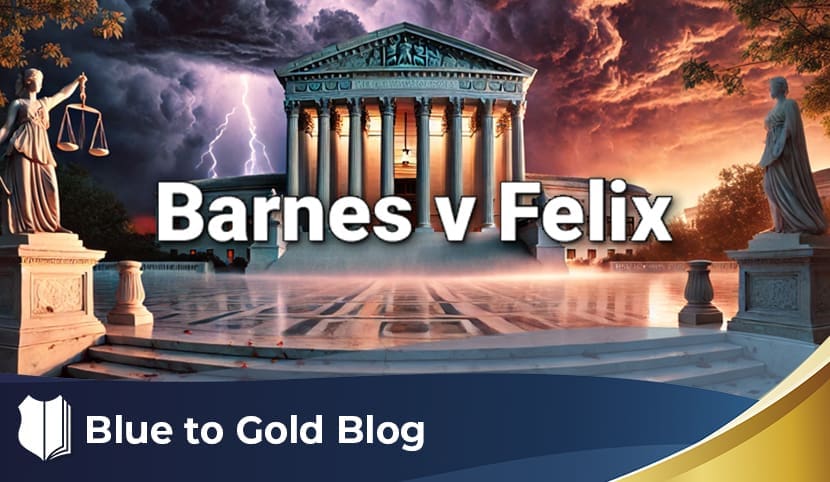This is a commentary on Corniglia V. Strong, US Supreme Court, May 17, 2021. This is a massively, important case on two fronts.
Number one: firearm confiscation and red flag laws.
Number two: a little more guidance on the so called Community Caretaking Doctrine as it applies to homes.
Let me give you some quick facts. This occurred in Rhode Island. The background on what happened is that cops were called to a house because a husband, the night before, kind of threatened suicide in an indirect way. He told his wife that he was tired of fighting, tired of arguing. “Why don’t you just shoot me right now and get it all over with?” That was kind of his tone. The wife then went to a hotel for the night. She called the husband the next morning. No answer. She feared that he actually did commit suicide.
She called the police to do a welfare check on him. They ended up contacting him and he basically assured the cops that he was not a danger to himself. However, he did agree to go to the hospital voluntarily to do a mental, psychiatric evaluation. While he was gone, the cops then spoke to the wife, and she returned to the home several hours later.
After speaking to the wife, the officers knew that he had a gun, or guns. They entered the home without a warrant, without consent, and no exigency, to go seize the husband’s firearms. Would community caretaking apply here? The rationale is that if we don’t seize these guns, maybe he comes back from the hospital and kills his wife, kills himself and so forth. So this would be something like best practice, correct?
But think about it; when you enter a home to investigate a domestic violence situation, you do not get into that home simply because it’s a domestic violence call. No, you get in there, if you get in there, because you’re able to articulate some kind of exigency, emergency, and so forth under the Mercy Doctrine; to protect somebody, to protect a wife, to render aid, to prevent the husband from hurting his family and so forth. And also to investigate what’s going on. So that’s why you get in there.
Well, community caretaking is not dependent upon exigency. It doesn’t require exigency. It just requires a reason to believe somebody needs or wants your help. Even if there is no exigency, community caretaking is often applied to cars and pedestrians. You see a driver maybe driving very slowly on the highway. That’s not illegal, but maybe just a mechanical issue. So you stop the car and check on the driver. “Hey, are you okay?” “Is your car okay?” That is community caretaking. There is no exigency there; nobody’s in imminent danger and so forth.
Well, let’s return to the case. The husband sues to get his guns back. He has a lot of problems getting his guns, but he finally gets them back. Then he sues over this whole entry. He’s saying, “Look, you should have never even gone into my house under those conditions.” And then he filed a federal lawsuit, and he lost. Then he appeals to the First Circuit and again loses. The First Circuit affirmed the actions of the police by saying that this was legitimate community caretaking.
At this point, we have the First Circuit case. But, it’s not okay! And here’s why: because warrantless entries into the home are fundamentally based on some form of emergency, exigency, or safety issue; something! Under those circumstances, we cannot wait for judicial pre-approval. That’s what warrantless home entries are based on.
Now, this case went to the US Supreme Court, and the decision was written by Justice Thomas. He confirmed that the community caretaking doctrine does not apply to homes. He wrote that it has never applied to homes, and wrote about needing the other traditional requirements for entering the home; emergency aid, consent, hot pursuit, that type of thing.
So the ramifications of this case are wide, and extremely far-reaching for two reasons.
Number one, let’s talk about red flag laws. Many states around the country are trying to pass laws or have passed laws that allow police officers to enter a home to seize firearms for safekeeping, even though the subject, the person who may be a danger to himself or others, is gone. Well, think about it. He’s gone. He’s already at the hospital. Or he’s already in the back of a police car. And so he’s there’s no way that he can access those weapons. What happens to those laws?
Well, my personal opinion is that they’re done. There is no way that you can enforce a red flag law that gives police permission to warrantlessly enter a home to seize firearms without judicial pre-approval. And don’t forget that that statute, if it says as much, cannot supersede the Fourth Amendment. So the Fourth Amendment, according to the Coniglio case, says that you need something more than just community caretaking to enter a home and seize firearms. So any kind of red flag law that says otherwise is certainly problematic. Now, can cops get consent from the wife or another occupant that has lawful access to the weapons? Sure. Now that could work. But if you don’t have that, then the traditional red flag law with no judicial authorization will not work.
Number two, on the other side, we have so many second amendment advocates that are looking at this case as a huge blow to gun grabbers. Reviewing red flag laws, there is a case to be made for seizing firearms to prevent imminent harm to other people. There’s certainly a time and a place for it. But a lot of these cases seem to involve an opportunity for some people to just grab firearms, without the necessary judicial pre-approval process. Also, in a lot of these states like New York and New Jersey that do seize firearms on a regular basis, it is almost impossible to get these guns back.
And that’s what the husband experienced in Rhode Island. By the way, he had to sue to get his guns back, even though he was found to be mentally fit and not a danger to himself or others. And then, of course, the other issue is that finally, we finally have a Supreme Court case directly on point, that says that community caretaking does not apply to homes. That just makes sense, because basically there may be no exigency!
That’s a great case. It has far-reaching consequences. We’ll see how it plays out.








